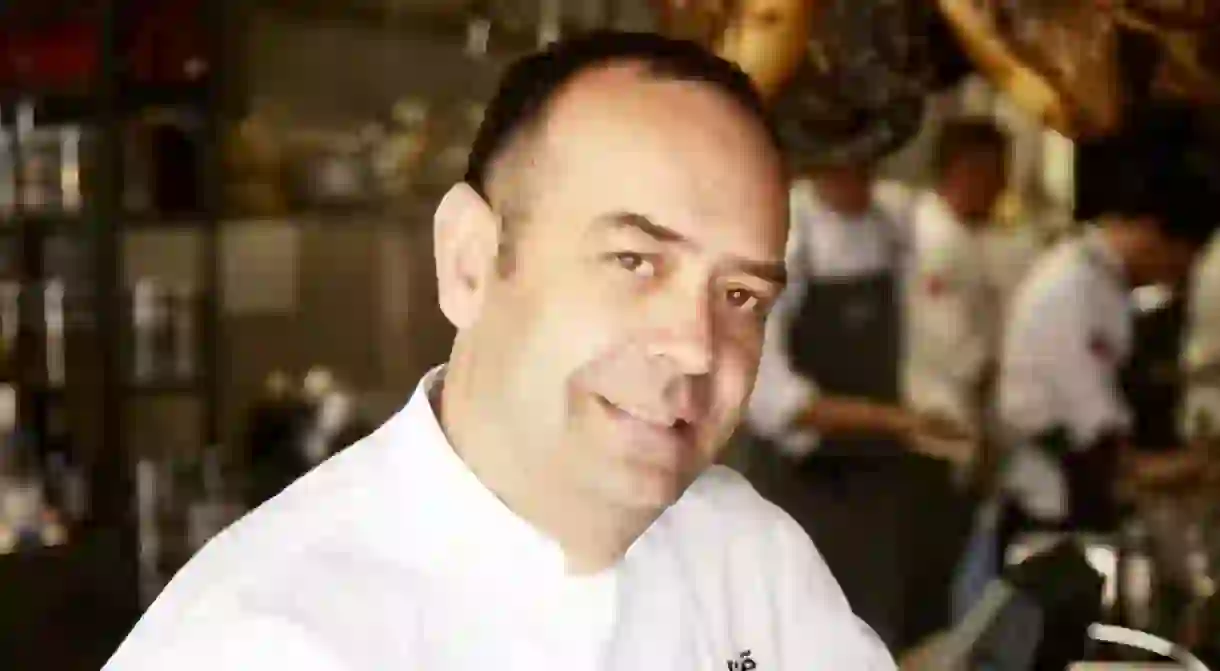Spotlight On Chef José Pizarro

With three eponymous spots in London, José Pizarro has brought traditional Spanish cuisine to the fore – with his own twist and modern technique. We had a catch-up with the talented chef to discuss the popularity of octopus, the joy of cooking and his lovely mother.
There’s something sweet and endearing about the way José Pizarro speaks. The way he emphasises the word lovely when describing food, namely the chocolate pot with olive oil on his menu, which is the dish he would choose to be his dessert for the last meal of his life.

‘You’re a hard man to get a hold of!’, I joke, as we had had to reschedule our phone interview multiple times due to his intense schedule. He is profusely apologetic. ‘Time just flies!’ he explains, in his melodic Spanish accent.
His success and its highlights all come down to one thing for José: the people he’s met on the way. ‘I’ve met so many amazing people, that everything else comes second. It’s all about the people, you know? When Tracey Emin came to me and said ‘I love what you do,’ I mean… Tracey Emin! You know what I mean? She’s amazing.’ When asked who he would love to eat his food, he laughs: ‘I’m so lucky, I’ve cooked for almost all the people I’d love to cook for. But Picasso, I would have loved to cook for Picasso. Unfortunately, it’s not going to happen!’

His beginnings as a chef were modest and slow-burning. “I started a cookery course, and I never looked back. It was a school where we learnt all the techniques. Slowly, slowly, slowly, I just fell in love. And I couldn’t get back to anything else.’
Restaurant kitchens during service are places of madness, shouting and a high-level of stress. Some chefs thrive off this, some prefer to keep it chilled. José, I discovered, is the (rare) latter. ‘The activity is important for me, I enjoy the energy. But I don’t enjoy shouting and all that anymore, it’s all about creativity and having a good time with your staff. When it’s crazy, no. Not my thing. It’s all about the joy, and taking the time, making something lovely. It’s the only way to be!’That was the first time he said lovely, and I just couldn’t help but smile to myself.

‘My mum is my biggest critic’ he confesses, ‘she’s also an amazing cook. And the most unbelievable woman in the world.’ A brief pause, and he says, oh so earnestly, ‘I love her.’
I pressed on to find out more about his dishes, and we ended up discussing the unexpected popularity of octopus on his menu. He explained that he never thought it would do as well as it did, but the different variations, mostly boiled, have done remarkably well in every location. I cannot help but mention that in the description of his octopus carpaccio, José described the olive oil topping as being doubly lovely – lovely lovely, if you will.
When it comes to tapas itself, José has a deep attachment to tradition and authenticity, ‘but, of course, with new flavours and new things so you don’t get bored. Traditional food, like the croquetas or a tortilla, it can be made better with new techniques.’ These techniques, he explained, are all in his books and can be read, understood and implemented by anyone. ‘When I go to my friends’ houses and if I see my book is dusty, I don’t like it.” He laughs. ‘Everyone can cook from these books.’

We talk food some more. ‘What would be your last meal on earth?’ I ask.
‘The starter would be nice pan con tomate y jamón (toasted bread with tomato and cured ibérico ham), the main would have to be my Mum’s baby goat stew; I love it.’ The desert, as aforementioned, was the lovely chocolate pot. ‘And the drink? Gin and Tonic, darling!’
When asked to describe his daily life in three words, he answers quickly, as if it were a mantra: ‘I am happy.’ I could almost feel José’s positivity radiating through the phone and there’s just one way to describe it: lovely.













